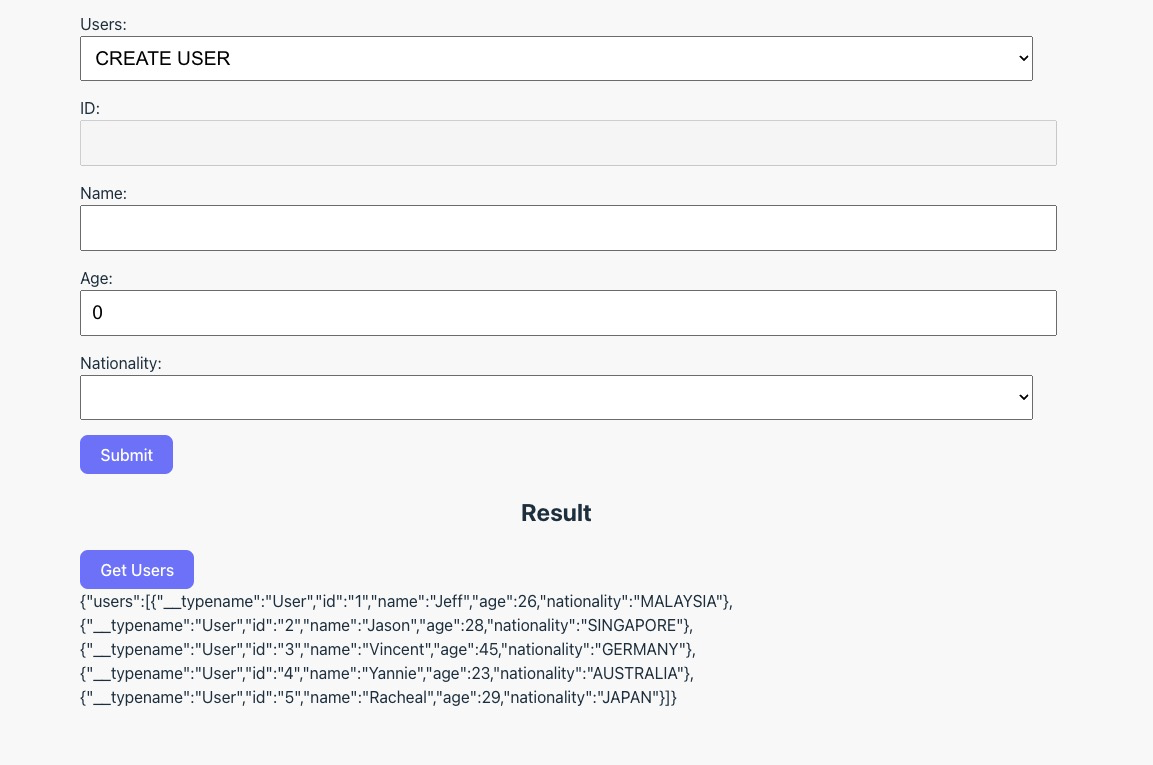Table of contents
Introduction
Before we get started, it’s high recommend to clone the Github repo so that we could follow along this tutorial and fill in the necessary code of the starter pack
What do we need?
Prerequisite
- Open the final pack of 03-graphql-server-typescript-codegen directory:
- Install the necessary packages by running
npm installcommand. - Start the GraphQL server locally by running
npm run startcommand and the server should start port4000
- Install the necessary packages by running
- Open the starter pack of 04-react-graphql-typescript-codegen directory:
- Install the necessary packages by running
npm installcommand. - Start the React server locally by running
npm run devcommand and the server should start at port5173
- Install the necessary packages by running
We can now navigate to http://localhost:5137/ and here is how the React application should look like
Objective
This project has been setup exactly the same as what we have done in the Connect GraphQL query and mutation in React Apollo Client article but it has been converted from Javascript to Typescript.
What we need to do ?
We would need to generate a GraphQL schema file that is powered by our GraphQL backend service in our React application andadd type safety into our App.tsx file.
GraphQL schema codegen
First and foremost, we would need to install the following dependencies to help us generate the GraphQL schema:
npm install @graphql-codegen/cli @graphql-codegen/typescript @graphql-codegen/typescript-operations -D
Then, we can create a codegen.yml file in our root directory with the following settings:
schema: http://localhost:4000/graphql
documents: src/operations/*.ts
ignoreNoDocuments: true
generates:
./src/schema.ts:
plugins:
- "typescript"
- "typescript-operations"
Explainations
- We first specific our
schemaproperty which will point to our GraphQL backend service to generate the GraphQL scalar types for us - We then let the code generator knows the directory of the GraphQL operations in
documentsproperty. - By setting
ignoreNoDocumentsto true, we’re telling GraphQL Code Generator not to worry if it doesn’t find any GraphQL operations in our frontend code. generatesproperty will be the place to specify the file directory of the generated GraphQL scalar type.- We could then add the plugins such as
typescriptandtypescript-operationsunderneath this property.
- We could then add the plugins such as
Once this is done, we can add a new script command in our package.json as such:
{
...
"scripts": {
...
"codegen": "graphql-codegen"
},
...
Let’s run npm run codegen and you should be able to see the schema file is generated under src/schema.ts directory !
Enable type-safe in the GraphQL Query and Mutation
Here will be the final code of our App.tsx file.
...
import {
CreateUserInput,
CreateUserMutation,
CreateUserMutationVariables,
GetUsersQuery,
GetUsersQueryVariables,
UpdateUserInput,
UpdateUserMutation,
UpdateUserMutationVariables,
} from "./schema";
function App() {
...
const [users, setUsers] = useState<UpdateUserInput[]>([]);
const { data, refetch } = useQuery<GetUsersQuery, GetUsersQueryVariables>(
GET_USERS
);
const [createUser] = useMutation<
CreateUserMutation,
CreateUserMutationVariables
>(CREATE_USER);
const [updateUser] = useMutation<
UpdateUserMutation,
UpdateUserMutationVariables
>(UPDATE_USER);
const onSubmit = async (data: UpdateUserInput) => {
const payload: CreateUserInput | UpdateUserInput = {
id: "",
name: data.name,
age: Number(data.age),
nationality: data.nationality,
};
try {
...
} catch (error) {
console.error(error);
}
};
...
return (
<>
<form onSubmit={handleSubmit(onSubmit)}>
...
</form>
</>
);
}
export default App;
Explainations
As you can observe the example above, the generated GraphQL schema file is allowing us to import the type such as the GraphQL Query and Mutation with it’s variable type as well as the Input type. We can then import them all and put them into a right place to enable a type-safe functionality in our React application.

